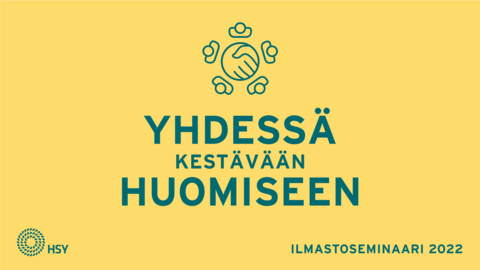Espoo in the Climate Panel: “Cities are impressive operating environments where we can do things in a new way”
In the Helsinki region climate seminar “Together for a sustainable tomorrow” on 24 May 2022, the most important measures for achieving climate goals were discussed.
The City of Espoo has set itself the goal of achieving carbon neutrality by 2030. In this case, the city produces only the amount of greenhouse gas emissions it can bind during the year. For the City of Espoo, carbon neutrality means an 80 per cent emission reduction from the 1990 level by 2030.
“Cities are impressive operating environments where we can do things in a new way. Cities need to create solution paths so that we can work smarter,” says Pasi Laitala, Deputy Director of Strategy, at the panel discussion.
“To achieve the climate goals, we need the entire community. It is not an individual performance, but rather a matter of cooperation in how we respond to the challenge,” Laitala continues.
The biggest emissions are caused by the heating of buildings. After heating, the largest regional sources of greenhouse gas emissions are traffic and electricity consumption.
The City of Espoo does not have its own energy company. We promote energy-related objectives in cooperation with operators in the field, research institutes and educational institutions as well as residents and property owners. The main measures focus on decarbonisation and transitioning to renewable energy production as well as investments related to energy efficiency and energy consumption. For example, the joint project between Microsoft and Fortum on investing in DataCenter in Hepokorpi, Espoo, and utilising the waste heat created there in district heating will significantly promote carbon neutrality in Espoo.
“Cooperation with companies, the scientific community and the city is long-term work that has been ongoing in Espoo for a long time. The scientific community brings vision, criticism, discussions and research to the solutions. It is up to the companies to find concrete, market-based and market-oriented solutions. One of the key roles of the cooperation between companies, the scientific community and the city is to create something new and better. We belong to a good climate-related business segment in Espoo. We do well in it and constantly do good things,” says Laitala, answering the question of how cooperation with research institutes works.
Check out the full climate panel discussion on the Climate Seminar’s YouTube playlist(external link, opens in a new window) (in Finnish).
In addition to Pasi Laitala, Director of Strategy of the City of Espoo, Johanna af Hällström, Team Leader of the City of Helsinki, Jari Viinanen, Director of Environmental Affairs of the City of Vantaa and Anna-Lena Granlund-Blomfelt, Director of Environmental Affairs of the City of Kauniainen, participated in the climate panel discussion. The discussion was moderated by journalist Kimmo Ohtonen.
